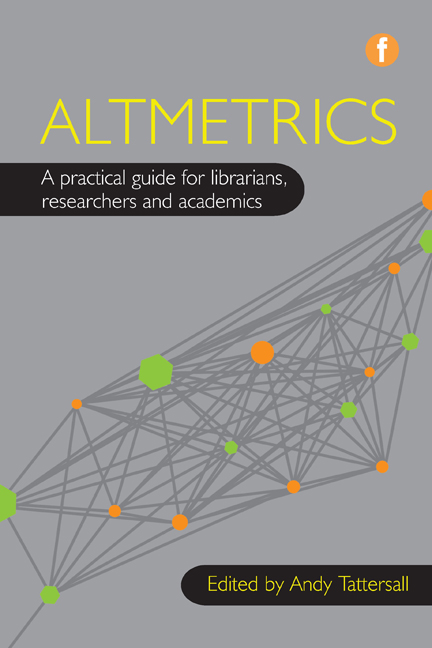Book contents
- Frontmatter
- Contents
- Contributors
- 1 Introduction
- 2 Road map: from Web 2.0 to altmetrics
- 3 ‘Metrics of the trade’: where have we come from?
- 4 The evolution of library metrics
- 5 The rise of altmetrics
- 6 Beyond bibliometrics: altmetrics reflects information about engagement with more types of scholarly content from more types of consumers
- 7 Considerations for implementing new technologies
- 8 Resources and tools
- 9 The connected academic: implementing altmetrics within your organization
- 10 Appmetrics: improving impact on the go
- 11 Open peer review
- 12 Conclusion
- Index
10 - Appmetrics: improving impact on the go
Published online by Cambridge University Press: 08 June 2018
- Frontmatter
- Contents
- Contributors
- 1 Introduction
- 2 Road map: from Web 2.0 to altmetrics
- 3 ‘Metrics of the trade’: where have we come from?
- 4 The evolution of library metrics
- 5 The rise of altmetrics
- 6 Beyond bibliometrics: altmetrics reflects information about engagement with more types of scholarly content from more types of consumers
- 7 Considerations for implementing new technologies
- 8 Resources and tools
- 9 The connected academic: implementing altmetrics within your organization
- 10 Appmetrics: improving impact on the go
- 11 Open peer review
- 12 Conclusion
- Index
Summary
Introduction
Mobile ‘smart’ devices have increased greatly in popularity since Apple's first iPhone, with 61% of UK adults now owning a smartphone (Ofcom, 2014). The emergence of the tablet computer has added significantly to the utilities available via mobile devices, and the adoption of mobile technologies for work-related activities is ever expanding. However, relatively few academic staff who use these devices make full use of the range of options available, and many lack awareness of the apps they could be using to promote their outputs and improve impact on the go. Information professionals need to stay abreast of current and emerging developments in mobile apps in order to support academic staff in using their mobile devices effectively to improve and monitor their research impact.
There are many apps and tools to choose from. This chapter looks at an essential ‘toolkit’ of apps that information professionals should bear in mind when supporting and advising academic staff on research impact, and gives advice on how to make the best and most efficient use of them. Additionally, the chapter will examine how impact activities undertaken on a mobile device can be fitted into a flexible working day.
Glossary
The following are some key terms that I will use frequently throughout the chapter, and their definitions.
Android – an operating system developed by Google for use on smartphones and tablets. There is a very wide choice of devices, at varied price points. Updated regularly.
Blackberry OS – the operating system used by Blackberry smart devices. Declining in popularity in recent years, but still quite widely used by business people and in countries such as India.
iOS – the operating system developed for Apple mobile devices. Only iPhones and iPads run iOS. Updated regularly.
OS – acronym for operating system. The most popular ones for mobile devices are iOS and Android, but there are also Windows Mobile and Blackberry, among others.
Smart device – any mobile computing device that can connect to the web via 3G/4G or WiFi. These include tablet computers such as iPads, smartphones and small-format laptops such as Netbooks and Chromebooks.
Windows Mobile – the operating system developed for Microsoft Windows mobile devices. There is a wider range of devices to choose from than with iOS, but fewer than with Android.
- Type
- Chapter
- Information
- AltmetricsA practical guide for librarians, researchers and academics, pp. 163 - 182Publisher: FacetPrint publication year: 2016



